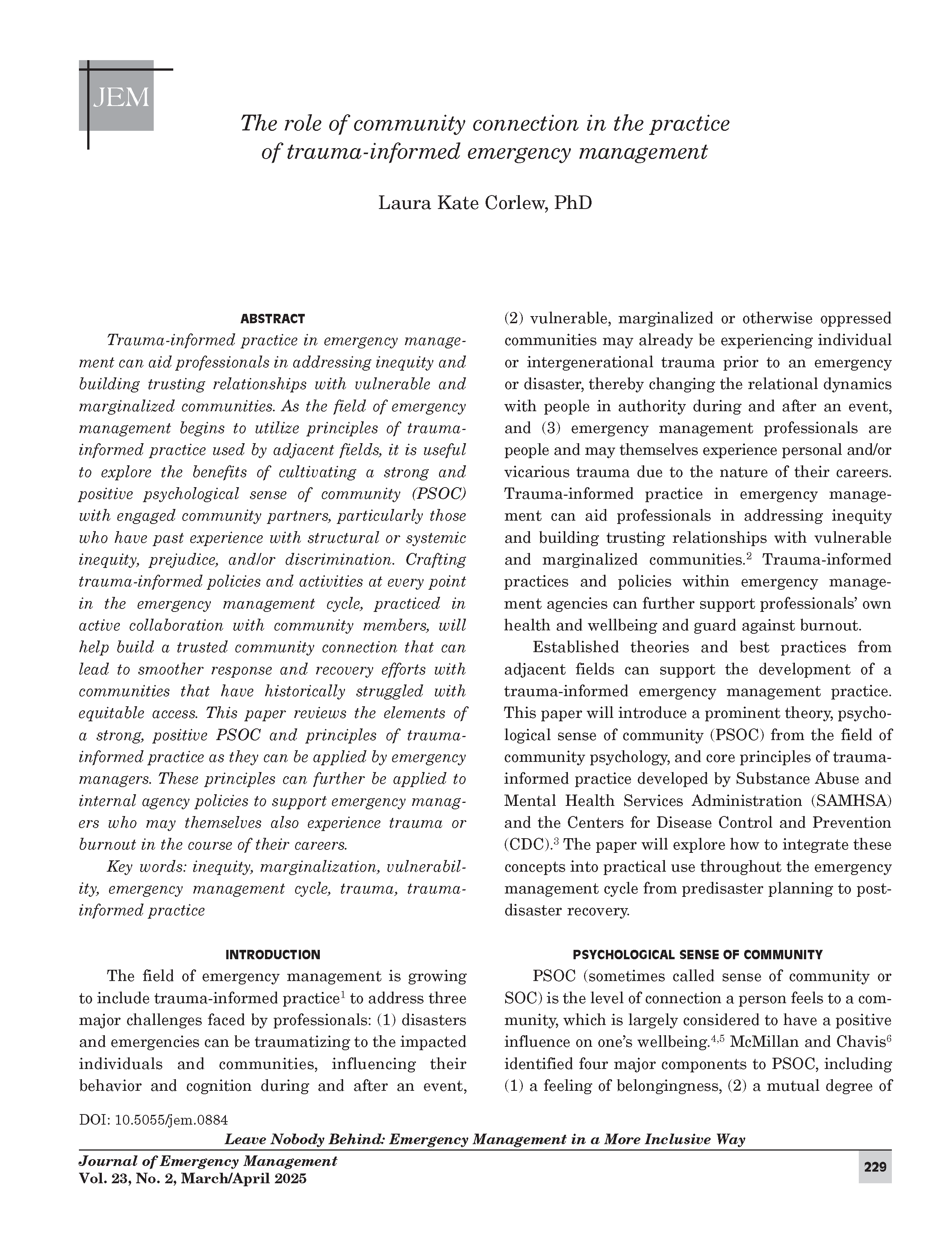The role of community connection in the practice of trauma-informed emergency management
DOI:
https://doi.org/10.5055/jem.0884Keywords:
inequity, marginalization, vulnerability, emergency management cycle, trauma, trauma-informed practiceAbstract
Trauma-informed practice in emergency management can aid professionals in addressing inequity and building trusting relationships with vulnerable and marginalized communities. As the field of emergency management begins to utilize principles of trauma-informed practice used by adjacent fields, it is useful to explore the benefits of cultivating a strong and positive psychological sense of community (PSOC) with engaged community partners, particularly those who have past experience with structural or systemic inequity, prejudice, and/or discrimination. Crafting trauma-informed policies and activities at every point in the emergency management cycle, practiced in active collaboration with community members, will help build a trusted community connection that can lead to smoother response and recovery efforts with communities that have historically struggled with equitable access. This paper reviews the elements of a strong, positive PSOC and principles of trauma-informed practice as they can be applied by emergency managers. These principles can further be applied to internal agency policies to support emergency managers who may themselves also experience trauma or burnout in the course of their careers.
References
Everett A, Sugarman O, Wennerstrom A, et al.: Community-informed strategies to address trauma and enhance resilience in climate-affected communities. Traumatology. 2020; 26(3): 285-297. DOI: 10.1037/trm0000225.
Every D, Pedler A, Collyer-Braham S: Out of the storm: Extreme weather resilience for community homelessness. Aust J Emerg Manag. 2020. Available at https://knowledge.aidr.org.au/resources/ajem-january-2020-out-of-the-storm-extreme-weather-resilience-forcommunity-homelessness/. Accessed September 9, 2024.
Centers for Disease Control and Prevention: 6 guiding principles to a trauma-informed approach. 2020. Available at https://stacks.cdc.gov/view/cdc/56843. Accessed September 9, 2024.
Brodsky AE: Multiple psychological senses of community in Afghan context: Exploring commitment and sacrifice in an underground resistance community. Am J Commun Psychol. 2009; 44: 176-187.
Sarason SB: The Psychological Sense of Community: Prospects for a Community Psychology. San Francisco: Jossey-Bass, 1974.
McMillan DW, Chavis DM: Sense of community: A definition and theory. J Commun Psychol. 1986; 14: 6-23.
Ohmer ML: How theory and research inform citizen participation in poor communities: The ecological perspective and theories on self- and collective efficacy and sense of community. J Hum Behav Soc Environ. 2010; 20(1): 1-19. DOI: 10.1080/10911350903126999.
Sonn CC, Fisher AT: Sense of community: Community resilient responses to oppression and change. J Commun Psychol. 1998; 26(5): 457-472.
Hernandez SG, Corlew LK: Community psychologists in community gardens: A fertile ground for ecological inquiry. Commun Psychol. 2016; 49(3): 6-11.
Bishop B, Colquhoun S, Johnson G: Psychological sense of community: An Australian aboriginal experience. J Commun Psychol. 2006; 34(1): 1-7.
Flavel C: Why does disaster aid often favor White people? The New York Times, June 7, 2021. Available at https://www.nytimes.com/2021/06/07/climate/FEMA-race-climate.html. Accessed September 9, 2024.
Falkenburger E, Arena O, Wolin J: Trauma-informed community building and engagement. The Urban Institute. 2018. Available at https://www.urban.org/sites/default/files/publication/98296/traumainformed_community_building_and_engagement_0.pdf. Accessed September 9, 2024.
Boyle E, Galvin M, Revez A, et al.: Flexibility & structure: Community engagement on climate action & large infrastructure delivery. Energy Policy. 2022; 167: 113050. DOI: 10.1016/j.enpol.2022.113050.
Gilmer TP, Center K, Casteel D, et al.: Developing trauma resilient communities through community capacity-building. BMC Public Health. 2021; 21(1): 1681. DOI: 10.1186/s12889-021-11723-7.
Substance Abuse and Mental Health Services Administration: SAMHSA’s concept of trauma and guidance for a trauma-informed approach. HHS Publication No. (SMA) 14-4884. Rockville, MD: Substance Abuse and Mental Health Services Administration, 2014. Available at https://ncsacw.acf.hhs.gov/userfiles/files/SAMHSA_Trauma.pdf. Accessed September 9, 2024.
Khan H, Vasilescu L, Khan A: Disaster management cycle: A theoretical approach. Manag Mark. 2008; 6(1): 43-50.
Piltch-Loeb R, Bernard D, Quinones B, et al.: Engaging community leaders to identify community assets for emergency preparedness. Disaster Med Public Health Prep. 2022; 16(4): 1452-1458. DOI: 10.1017/dmp.2021.103.
O’Sullivan TL, Kuziemsky CE, Toal-Sullivan D, et al.: Unraveling the complexities of disaster management: A framework for critical social infrastructure to promote population health and resilience. Soc Sci Med. 2013; 93: 238-246. DOI: 10.1016/j.socscimed.2012.07.040.
DePrince AP, Alexander A, Cook JM, et al.: A roadmap for preventing and responding to trauma: Practical guidance for advancing community-engaged research. Psychol Trauma. 2022; 14(6): 948-955. DOI: 10.1037/tra0001159.

Published
How to Cite
Issue
Section
License
Copyright 2007-2025, Weston Medical Publishing, LLC and Journal of Emergency Management. All Rights Reserved.





